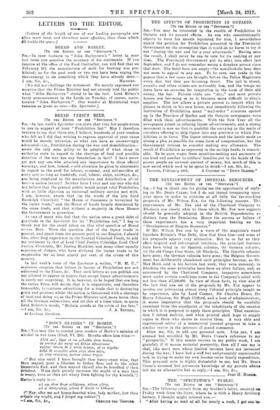BREAD VERSUS BEER.
[To THE EDITOR OF THE " SPECTATOR."] SLR,—In last week's Spectator you state that very few people wrote to you in support of your " Prohibition fad." May I therefore venture to say that there are, I believe, hundreds of your readers who felt as I did that writing to express approval of your cause would be merely intrusion, as what you have so unswervingly advocated—viz., Prohibition during the war and demobilization— seems the only sane policy to be adopted if what those in authority state in regard to the shortage of food and possible duration of the war has any foundation in fact? I have never yet met any one who attached any importance to these official warnings, and how, indeed, could attention be given to statements in regard to the need for labour, economy, and self-sacrifice of every sort so long as foodstuffs, coal, labour, ships, railways,
are being employed in the manufacture and distribution of—at best—a useless luxury? Neither have I ever met any one who did not believe that the general public would accept total Prohibition with as little objection as universal military service met with. I am, however, aware that (in the words of the late Lord Randolph Churchill) " the House of Commons is terrorized by the liquor trade," and the House of Lords largely dominated by the same trade, and that without a majority in these Houses the Government is powerless.
As one of many who feel that the nation owes a great debt of gratitude to the Spectator for its " Prohibition fad," I beg to thank you for tho stand taken on this vital question of Bread versus Beer. Were the question that of the liquor trade in general, and apart from the present peril to our Empire, I should like, after long experience in the Central Criminal Court, to add my testimony to that of Lord Chief Justice Coleridge, Lord Chief Justice Alverstone, Mr. Justice Hawkins, and many other equally experienced Judges, who have declared the liquor trade to be responsible for at least ninety per cent: of the crime of this country.
In last week's issue of the Spectator a writer, "H. M. C.," expresses surprise that letters in favour of Prohibition are not addressed to the Times, &c. That such letters as you publish are not allowed to appear in papers that accept liquor advertisements is surely not surprising. It is, however, to be hoped that ere long the entire Press will decide that it is unpatriotic, and therefore Impossible, to continue advertising for a trade that is destroying (rain and potatoes whilst the nation is threatened with a shortage of food, and doing us., as the Prime Minister said, more harm than all the German submarines, and all this at a time when, to quote Lord Roberts's words, "Britain stands at the crisis of her fate."


























 Previous page
Previous page